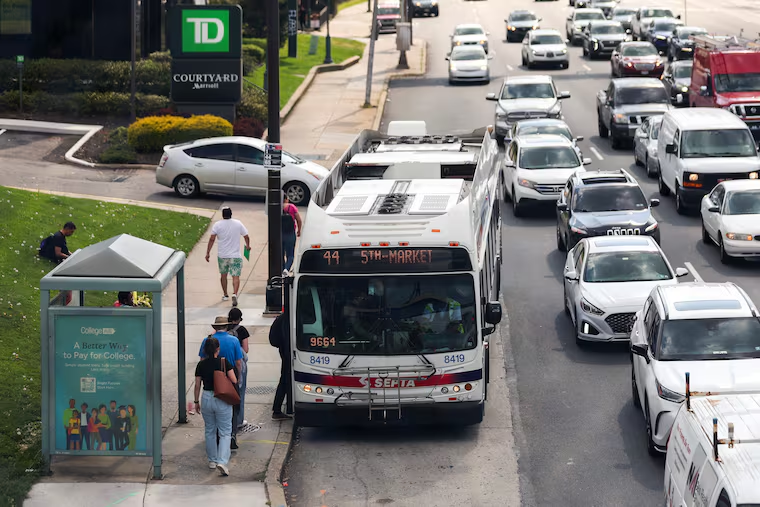Overhaul of SEPTA bus service is finally approved after years of debate
SEPTA's Bus Revolution is on the road as the board approved the route overhaul after more adjustments.

SEPTA’s board on Thursday approved the first comprehensive bus-route overhaul in the agency’s 60 years after a last-minute pause for more public meetings demanded by City Council members with equity concerns.
Those eight discussions took place in March and early April, most of them in historically disadvantaged neighborhoods. SEPTA made several changes to its proposal in response to criticisms people raised there.
“This is the first time we’ve done this since the creation of SEPTA. I hope one of the lessons that we take away from this is that we won’t wait another 60 years to do it again,” Kenneth E. Lawrence, SEPTA’s board chairman, said before the vote. ”We understand that there’s still some concerns … we’re going to continue to look at this.”
SEPTA says it plans to fully implement route changes in the summer of 2025 after an extensive campaign of public education.
Maps and descriptions of the plan, including comparisons with current routes, are available on https://www.septabusrevolution.com/.
“We know that we need change,” said Leslie S. Richards, CEO and general manager of SEPTA. “We know that our bus service, as it exists today, is not serving the number of people and is not providing the frequent service that we need.”
Why approval has been delayed
The board was poised to approve final maps after two years of public input on Jan. 25, when Councilmember Katherine Gilmore Richardson, an at-large Democrat who is the chamber’s majority leader, requested the delay.
She said Council wanted to make sure communities overlooked in the previous two years of public engagement were fully heard. The plan was tabled again Feb. 8 as SEPTA, and the lawmakers set new meetings.
SEPTA released the latest version of the Bus Revolution on April 30.
Gilmore Richardson said in a statement that the new plan “better meets the needs of Philadelphia’s diverse communities,” praising SEPTA for acting on the concerns of people who’ve used the bus system for generations “and rely on it to live their daily lives.”
What SEPTA changed
The transit agency restored several intended changes to some routes contained in the December 2023 Bus Revolution plan:
Keep Route 32 between Roxborough and South Broad Street to continue serving Strawberry Mansion, where it is a valued connection for the neighborhood, and Fairmount.
Continue Route 16 all the way south to City Hall.
On Route 57 every trip would travel from Fern Rock to Fourth and Oregon, with 15 minutes scheduled between buses. Every other trip would travel down to Broad Street and Pattison Avenue at 30-minute intervals.
Route H will become Route 71 traveling between Cheltenham and Ogontz to Broad and Erie, to preserve connections in Mount Airy and Germantown to the Broad Street Line.
Route 26 will be extended through East Falls, providing a crosstown connection between the Wissahickon and Frankford Transit Centers.
Route 12 to 50th and Woodland will be realigned in Center City to take advantage of bus-only lanes on Chestnut Street.
Route 73 will replace the current Route 25 and be extended along Aramingo and Frankford Avenues.
SEPTA undertook the overhaul in 2021 in hopes of reversing a slide in bus ridership that began several years before the pandemic, due to slow speeds, increasing unreliability, and changes in travel patterns.
The idea was to simplify bus routes and remove duplications.
“This continued adaptation is a positive sign: SEPTA is open to change and responsive to its riders,” the advocacy group Transit Forward Philadelphia said in its assessment of the final version.
“But we also continue our refrain: A cost-neutral redesign will always be incomplete, while to make no changes is to accept decline,” the group wrote.
SEPTA planners were directed to redesign the bus network so that it would provide the same hours of service as today, meaning that an expansion in frequency of service on one route would have to be balanced by cuts elsewhere.
Frustrations persist
At the board meeting Thursday, some members of the public spoke in favor of adopting the plan while others still expressed concerns about the changes it will bring.
“Thank you for being amenable to some of the community outreach that we knew we needed in order to make a better plan,” Council Majority Leader Katherine Gilmore Richardson said addressing the board.
“I stand today with you in support of the bus revolution plan moving forward,” she said.
Others are still concerned about the changes.
For instance, buses are now scheduled every half hour on Route 28 in Northwest Philadelphia and eastern Montgomery County, but that would drop to hourly service in the plan. Cheltenham Township officials and Manor College, a Jenkintown school, have said the reduction will be devastating to them.
Manor College serves a diverse set of students, many of whom are the first in their families to attend college; 76% of the students commute from Philadelphia, the college says.
“Even though its underlying objectives may be laudable, the fundamental problem of the Bus Revolution is that it seeks … to add resources to the stronger routes at the expense of the weaker ones,” said Mark D. Sanders of Ogontz, a longtime Route 28 rider and amateur transit historian.
An analysis by the Transit Center, a New York think tank, found that the December 2023 proposed changes would not worsen inequalities in access.